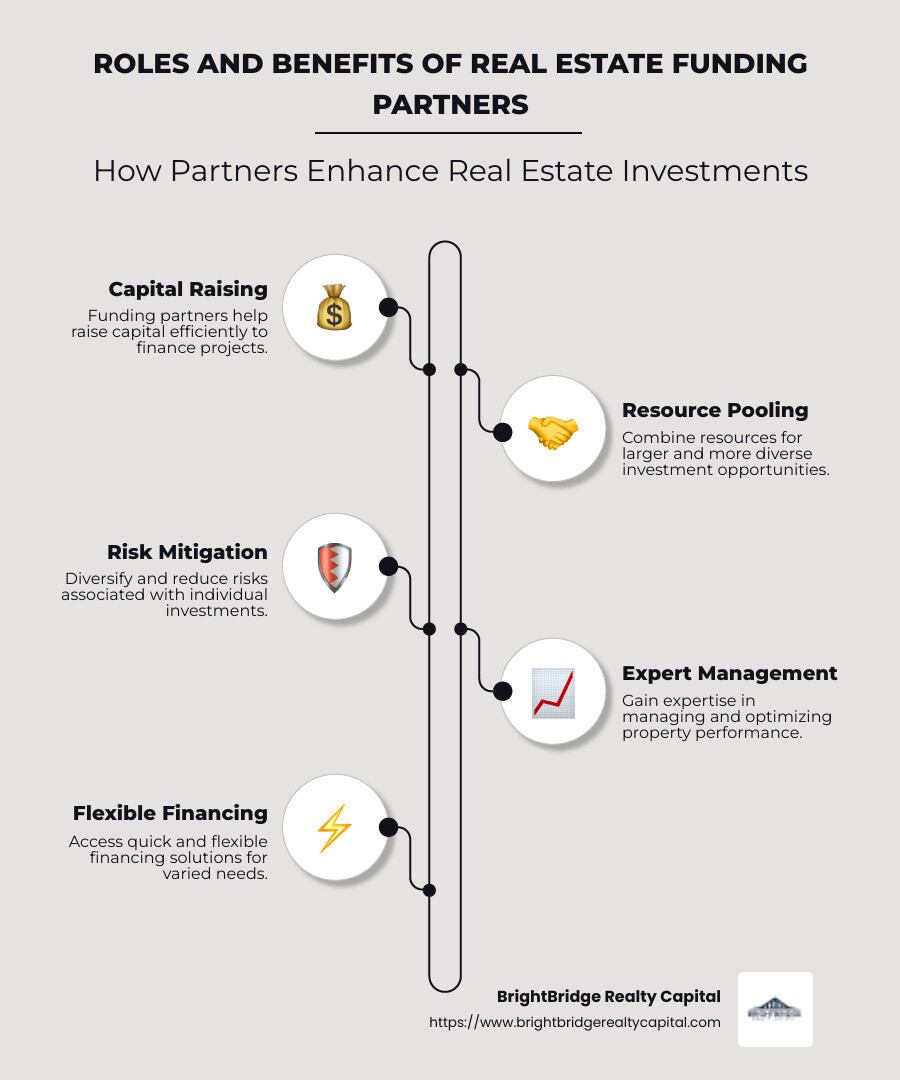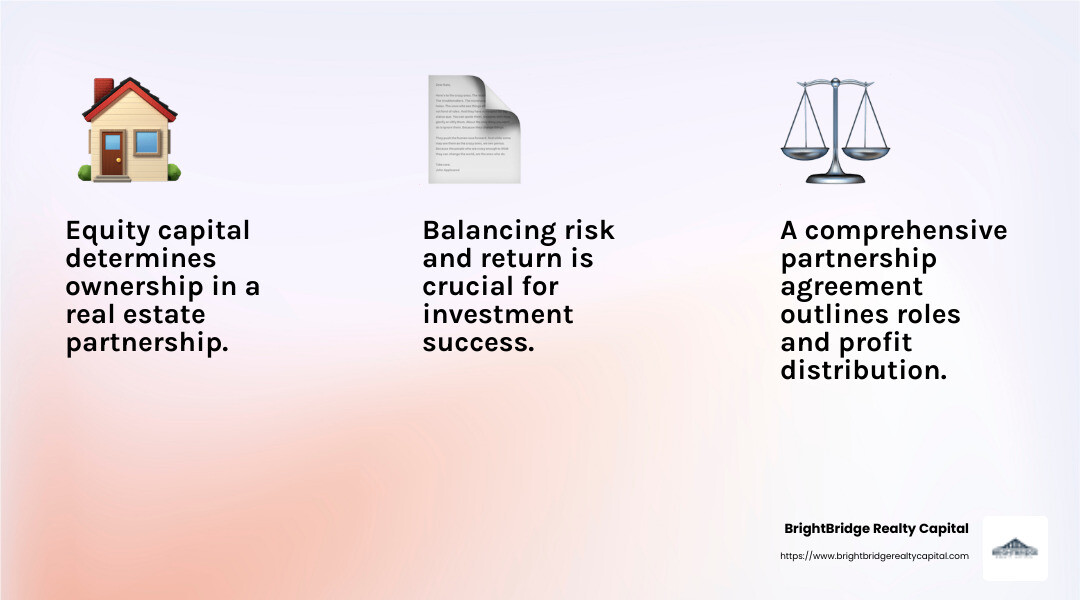The Perfect Match: Choosing a Real Estate Funding Partner

When diving into real estate, one of the key terms you'll encounter is real estate funding partner. If you're an investor seeking a quick, flexible financing solution, understanding the essence of these partnerships is essential.
Key Points:
- Real estate funding partner helps provide capital and expertise to manage investment properties effectively.
- They offer flexibility and speed in funding, ideal for investors looking to expand their rental portfolios or flip properties quickly.
- They play a critical role in pooling resources, mitigating risks, and enhancing overall investment success.
Real estate partnerships serve as a strategic approach for managing and holding title to investment properties. These partnerships can take various forms, such as LLCs, LLPs, or even S-Corps, each offering unique tax benefits and implications.
Real estate partnerships combine capital and expertise to manage investment properties efficiently. By collaborating with a real estate funding partner, you gain access to diverse investment opportunities and professional management to ensure that every property performs optimally.

Real estate funding partner vocabulary:
Understanding Real Estate Funding Partners
When it comes to real estate funding partners, one popular structure is the real estate limited partnership (RELP). In a RELP, investors pool their resources to invest in property. This setup allows for a more substantial investment than individual investors could achieve alone.
Real Estate Limited Partnership (RELP)
A RELP typically involves a general partner and several limited partners. The general partner, often an experienced property manager or real estate firm, handles the day-to-day management of the investment. The limited partners, on the other hand, contribute capital but are not involved in daily operations. This structure allows investors to benefit from the general partner's expertise while limiting their liability to the amount they invest.

Pooling Resources
Pooling resources in a real estate partnership opens doors to larger and more lucrative investment opportunities. By combining funds, investors can pursue properties and projects that would be out of reach for a single investor. This collective approach not only increases the potential for higher returns but also spreads the risk among multiple partners, making it a safer investment strategy.
Investment Opportunities
Real estate funding partners offer a variety of investment opportunities, from residential properties to commercial real estate. They can help investors gain access to different sectors of the real estate market, providing a diversified investment portfolio. This diversification can lead to more stable returns and reduced risk, as the performance of one property type may offset the performance of another.
In summary, real estate funding partners play a crucial role in pooling resources and providing access to a wide range of investment opportunities. By understanding the structure and benefits of real estate limited partnerships, investors can make informed decisions and maximize their potential for success in the real estate market.
Key Considerations When Choosing a Real Estate Funding Partner
Choosing the right real estate funding partner is a crucial step in maximizing your investment's potential. Here are the key considerations to keep in mind:
Equity Capital
Equity capital is the backbone of any real estate partnership. It's the money that partners contribute to the investment, and it determines how much ownership each partner has. When selecting a funding partner, ensure they have enough equity capital to support your investment goals.
A well-capitalized partner can help you access larger properties and projects, increasing your potential returns. They can also provide the financial stability needed to weather market fluctuations, reducing your investment risk.
Partnership Agreements
A clear and comprehensive partnership agreement is essential for a successful real estate partnership. This document outlines the roles, responsibilities, and expectations of each partner. It should detail how profits will be distributed, how decisions will be made, and what happens if a partner wants to exit the partnership.
When reviewing a partnership agreement, pay attention to:
- Compensation Structure: Understand how fees and profits are split. Are they based on performance or a fixed percentage?
- Decision Rights: Know who has the authority to make key decisions, such as refinancing or selling a property.
- Exit Strategy: Ensure there are clear terms for dissolving the partnership if needed.
A well-drafted agreement can prevent conflicts and ensure all partners are aligned on the investment strategy.
Risk-Return Balance
Every real estate investment carries some level of risk. The key is to find a risk-return balance that matches your investment goals and risk tolerance. A good funding partner will help you assess potential risks and rewards, providing insights into market conditions and property performance.
Consider the following when evaluating the risk-return balance:
- Market Knowledge: Does the partner have experience in the specific type of property or market you're interested in?
- Track Record: Review the partner's history with similar investments. Have they consistently delivered returns?
- Diversification: A partner who offers a range of investment opportunities can help you spread risk across different properties and markets.
By carefully evaluating these factors, you can choose a real estate funding partner that aligns with your financial objectives and provides the support needed to achieve them.

In the next section, we'll explore the different types of real estate partnerships, including syndicates, joint ventures, and private equity funds.
Types of Real Estate Partnerships
When it comes to real estate investing, choosing the right partnership structure is key. Let's explore three common types: real estate syndicates, joint ventures, and private equity funds.
Real Estate Syndicates
A real estate syndicate is like a team sport. Investors pool their money to buy and manage properties together. Typically, a sponsor (or syndicator) leads the charge. They scout for properties, raise capital, and manage the investments. Passive investors provide the bulk of the equity and enjoy a share of the profits without the hassle of day-to-day management.
Key Benefits:
- Access to Larger Deals: Syndicates allow investors to participate in larger properties that might be out of reach individually.
- Passive Income: Investors can earn returns without getting involved in property management.
- Potential Tax Benefits: Syndicates can offer tax advantages depending on the structure.
However, it's crucial to evaluate the sponsor's track record and the investment strategy before diving in. This ensures alignment with your investment goals and risk tolerance.
Joint Ventures
A joint venture (JV) is a partnership where two or more parties combine resources for a specific real estate project. Each partner brings something unique to the table, like capital, expertise, or property.
Key Features:
- Shared Responsibility: Partners share the risks and rewards based on their contributions.
- Flexibility: JVs can be custom to suit the specific needs of the project and the partners.
- Defined Purpose: Often set up for a single project or a limited time frame.
Joint ventures work well when partners have complementary skills and clear roles. For instance, a landowner might partner with a developer to build a new property. Each partner adds value, and neither could complete the project alone.
Private Equity Funds
Private equity real estate funds are designed for ongoing investments. A fund is established by a sponsor (general partner) to raise equity for multiple real estate deals. Investors, known as limited partners, contribute capital and enjoy returns based on the fund's performance.
Advantages:
- Diversification: Funds invest in a series of properties, spreading risk across different assets.
- Professional Management: Experienced managers handle the investment strategy and operations.
- Standardized Structure: Funds offer a consistent risk-reward framework for all investors.
Private equity funds are popular among larger investors looking for a hands-off approach with professional oversight. However, they're also accessible to smaller investors, providing a structured way to participate in real estate markets.
By understanding these types of partnerships, you can choose the one that best aligns with your investment strategy and goals. Next, we'll dig into the role of a real estate funding partner and how they contribute to successful investments.
The Role of a Real Estate Funding Partner
A real estate funding partner plays a crucial role in the success of real estate investments. They are like the backbone of the entire operation, ensuring everything runs smoothly and efficiently. Let's break down their key responsibilities: capital raising, investment management, and risk diversification.
Capital Raising
Imagine trying to buy a skyscraper on your own. Not easy, right? That's where a real estate funding partner steps in. They are experts at pooling resources from multiple investors to raise the necessary capital for large projects.
By leveraging their industry connections and expertise, these partners can secure funding that might otherwise be out of reach for individual investors. They often work with lenders who specialize in commercial real estate, making it easier to obtain financing on favorable terms.
Investment Management
Once the capital is raised, the real estate funding partner takes charge of managing the investment. This involves a lot more than just buying properties. It includes:
- Property Acquisition: Identifying and purchasing properties with strong potential for growth.
- Asset Management: Overseeing day-to-day operations to maximize returns.
- Financial Oversight: Ensuring the investment remains profitable by monitoring expenses and revenues.
The goal is to increase the property's value and generate profits for investors. A skilled partner will have a track record of successful projects and a deep understanding of market trends.
Risk Diversification
Investing in real estate always comes with risks. However, a good funding partner knows how to spread these risks across different investments. This is known as risk diversification.
By investing in a variety of properties and markets, they can reduce the impact of any one property's underperformance. For example, if one property struggles, others in the portfolio may perform well, balancing out the overall returns.
In conclusion, a real estate funding partner is essential for raising capital, managing investments, and diversifying risks. They provide the expertise and resources needed to steer the complex world of real estate investing. Next, we'll tackle some frequently asked questions about these partners and their benefits.
Frequently Asked Questions about Real Estate Funding Partners
What is a real estate funding partner?
A real estate funding partner is an entity or individual that provides the financial backing needed to invest in real estate projects. They help pool resources from multiple investors, making it possible to tackle larger and more lucrative projects than one could manage alone. Think of them as your financial ally in the complex world of real estate investments.
How do real estate funding partners work?
Real estate funding partners work by connecting investors with promising real estate opportunities. They play a pivotal role in:
Raising Capital: By gathering funds from multiple investors, they make it possible to pursue large-scale projects.
Managing Investments: They handle the acquisition, management, and oversight of properties to ensure profitability.
Risk Mitigation: Through diversification, they spread investments across different properties and markets, reducing potential risks.
For example, in a real estate syndicate, a sponsor scouts for properties and manages the assets, while passive investors provide the equity. This setup allows investors to benefit from real estate without being involved in day-to-day management.
What are the benefits of having a real estate funding partner?
Having a real estate funding partner offers several advantages:
Access to Larger Projects: They enable investments in high-value projects that might be out of reach for individuals.
Professional Management: Partners bring expertise in property management and market analysis, often leading to higher returns.
Risk Reduction: By diversifying investments, they help protect against market volatility and property-specific risks.
In summary, a real estate funding partner can be the key to open uping profitable investments and navigating the complexities of the real estate market.
Conclusion
Choosing the right real estate funding partner can make all the difference in your investment journey. At BrightBridge Realty Capital, we specialize in providing customized financing solutions that cater to the unique needs of each investor. Our goal is to ensure that your investment process is as smooth and efficient as possible.
One of our standout features is our ability to offer fast closings—often within a week. This speed is crucial in the competitive real estate market, where opportunities can vanish quickly. By cutting out intermediaries, we provide direct lending with competitive rates, ensuring that you get the best deal without unnecessary delays.
Whether you're interested in fix-and-flip projects, rental portfolios, or ground-up construction, our team is ready to support your goals with custom solutions. Our nationwide reach and expertise mean that no matter where your investment is located, you can count on us for reliable and flexible funding.
With BrightBridge Realty Capital, you're not just getting a lender—you're gaining a partner committed to your success. Find how we can help bridge the gap in your real estate financing needs by visiting our service page. Let us be your financial ally in navigating the exciting world of real estate investments.


